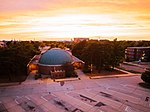Michigan State University College of Human Medicine

The Michigan State University College of Human Medicine (MSUCHM) is an academic division of Michigan State University (MSU) that grants the Doctor of Medicine (MD) degree, emphasizing patient-centered care and a biopsychosocial approach to caring for patients. Required courses at the college reinforce the importance of ethics and professionalism in medicine. In 2013, U.S. News & World Report ranked the college 46th for primary care. The college was also ranked for family medicine and rural medicine. More than 4,000 M.D.s have graduated from the college. Pre-clinical campuses are located on MSU's main campus in East Lansing, Michigan and in downtown Grand Rapids, Michigan, while the clinical rotations are at seven community campuses located throughout Michigan.
Excerpt from the Wikipedia article Michigan State University College of Human Medicine (License: CC BY-SA 3.0, Authors, Images).Michigan State University College of Human Medicine
Wilson Road, East Lansing
Geographical coordinates (GPS) Address Nearby Places Show on map
Geographical coordinates (GPS)
| Latitude | Longitude |
|---|---|
| N 42.7226 ° | E -84.464764 ° |
Address
Wilson Road
48824 East Lansing
Michigan, United States
Open on Google Maps






